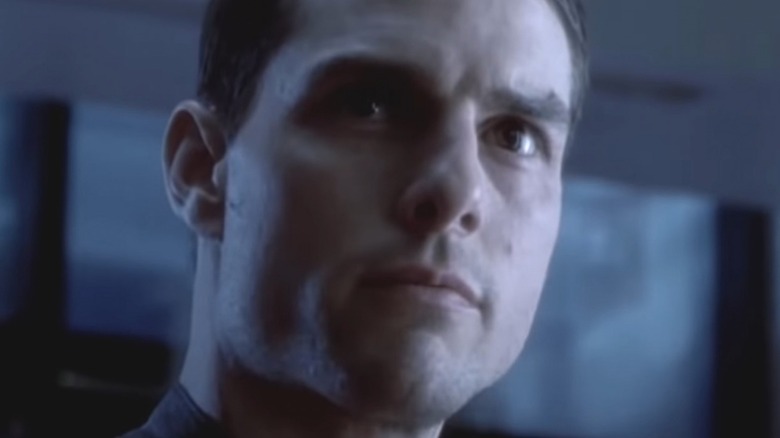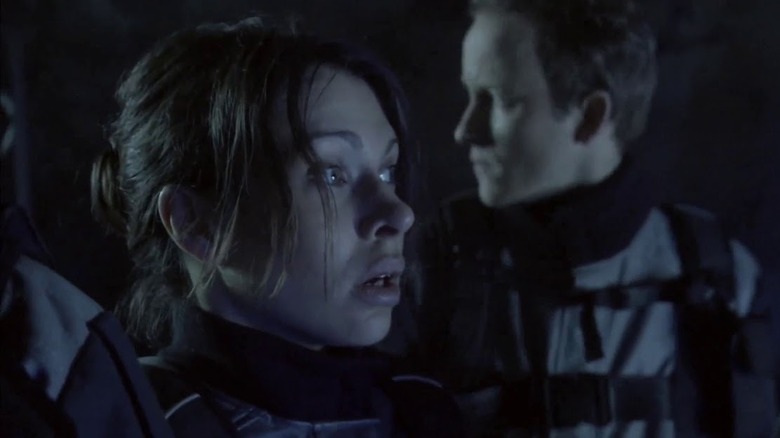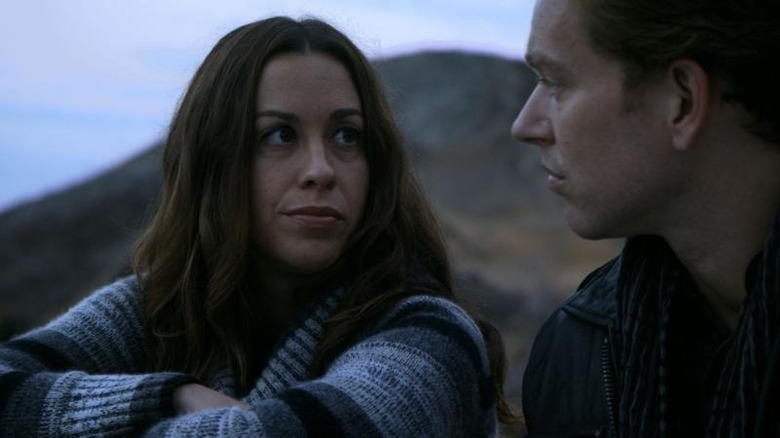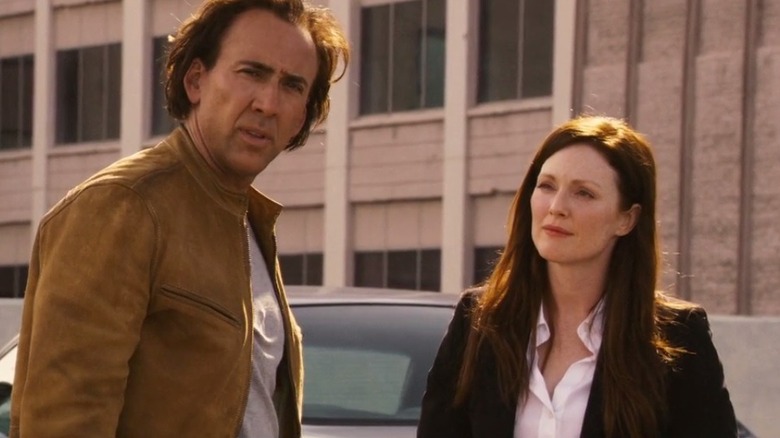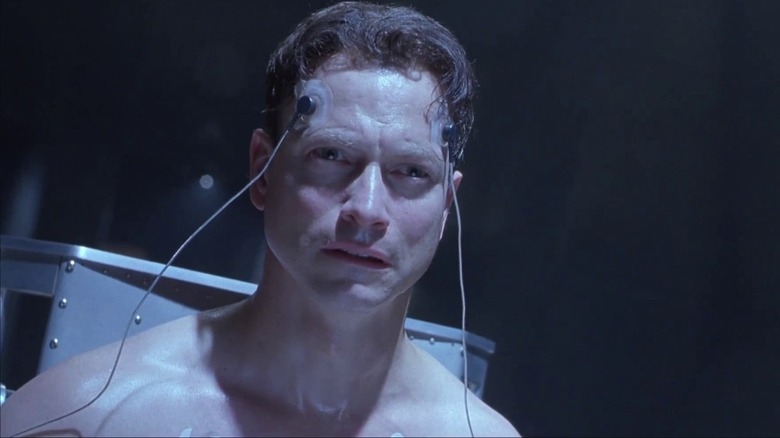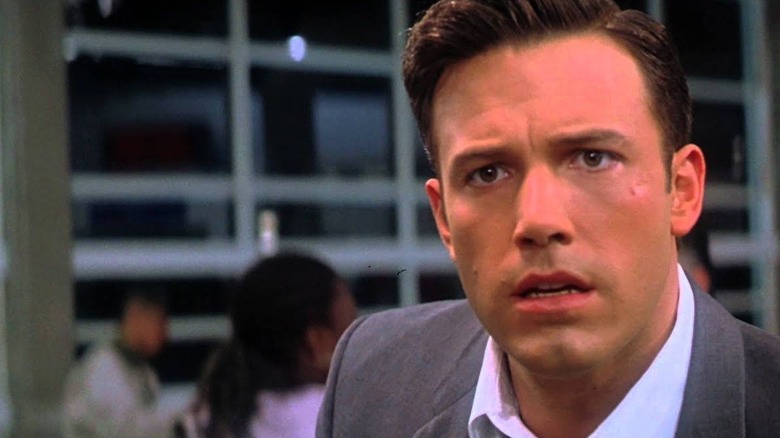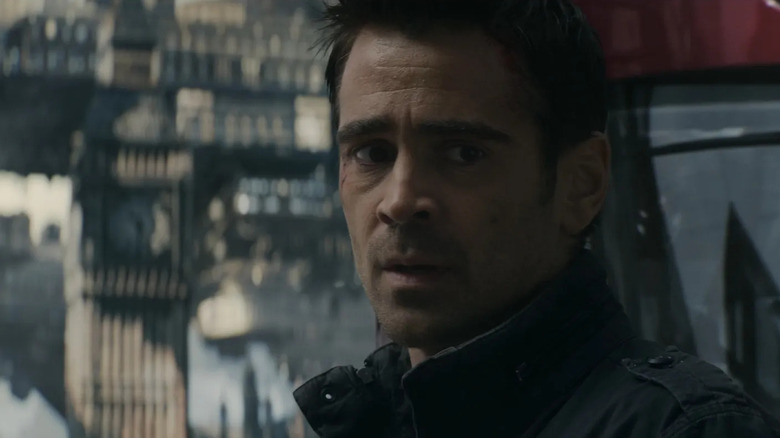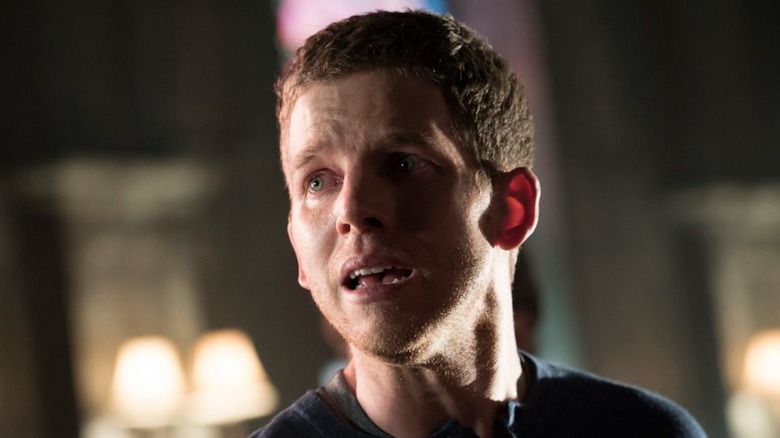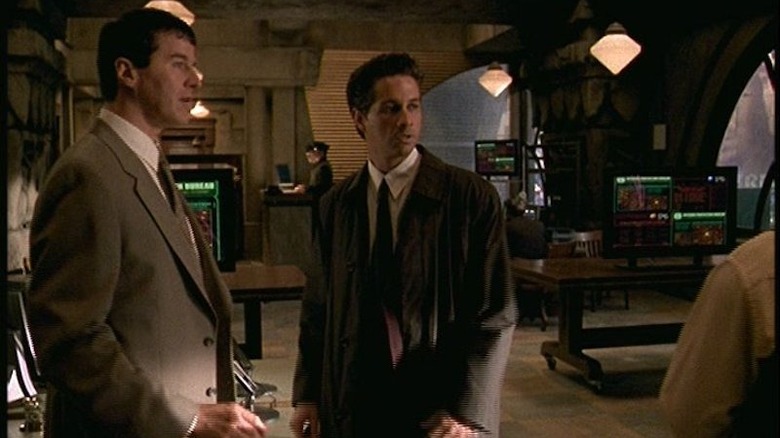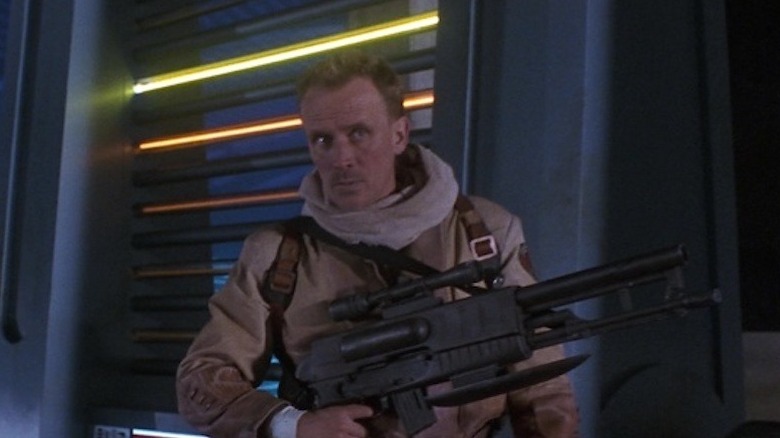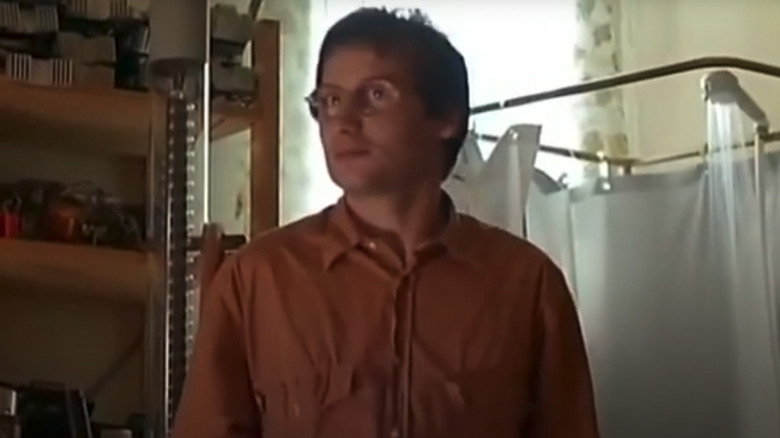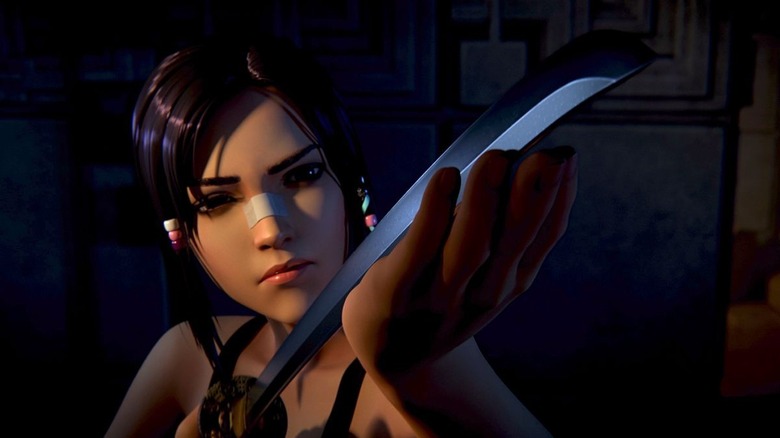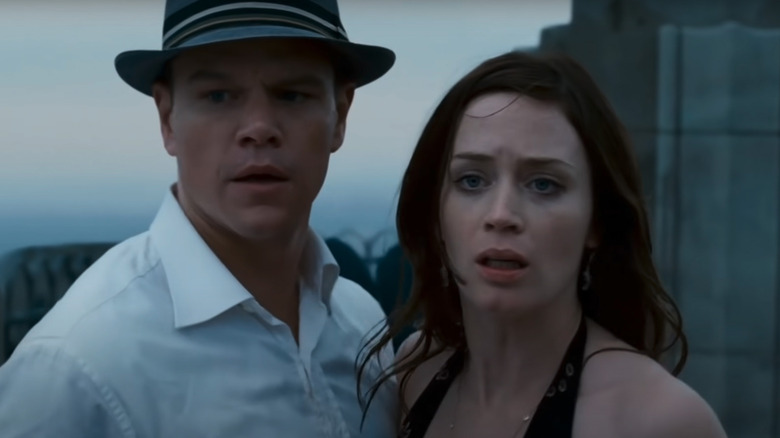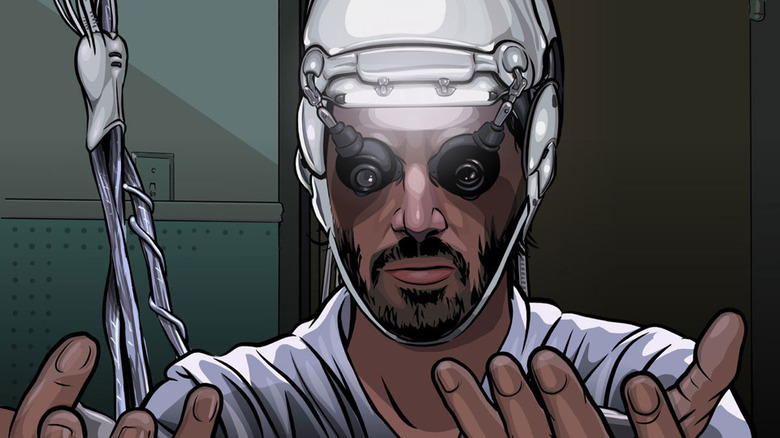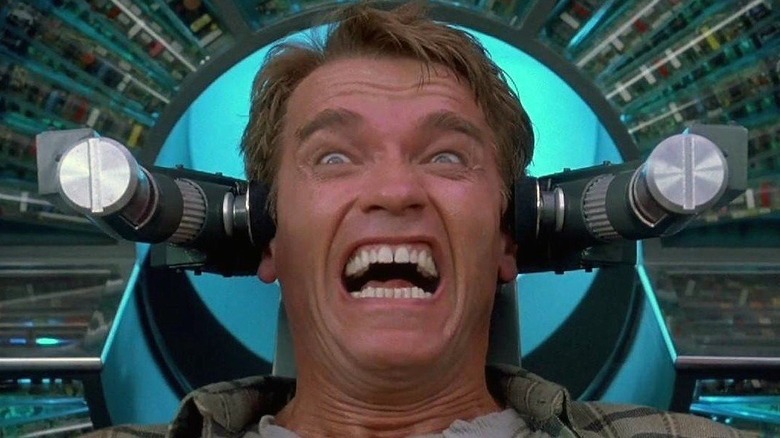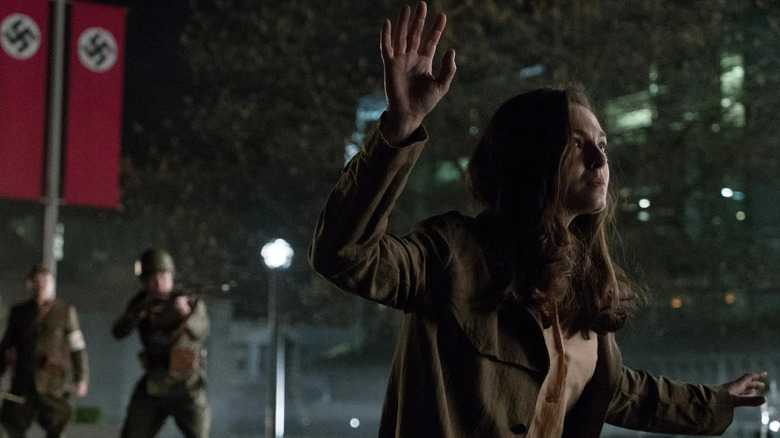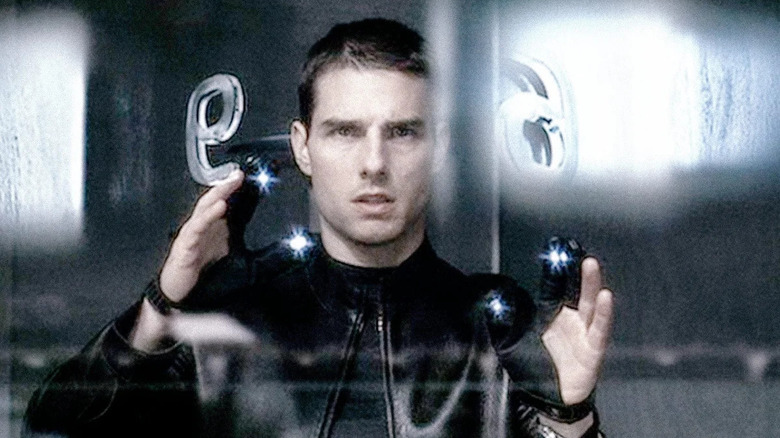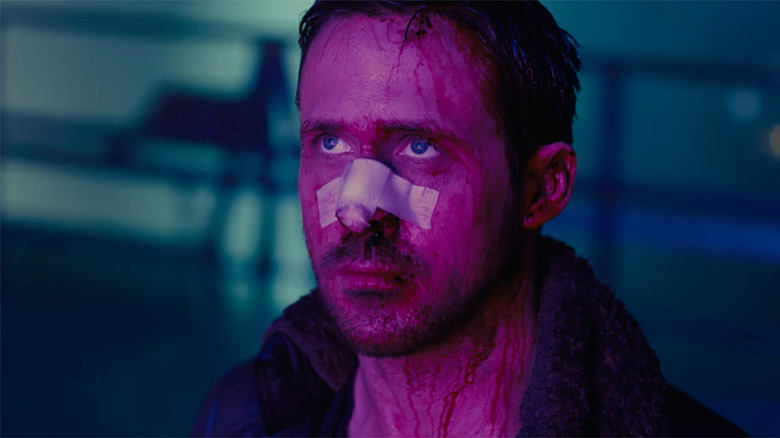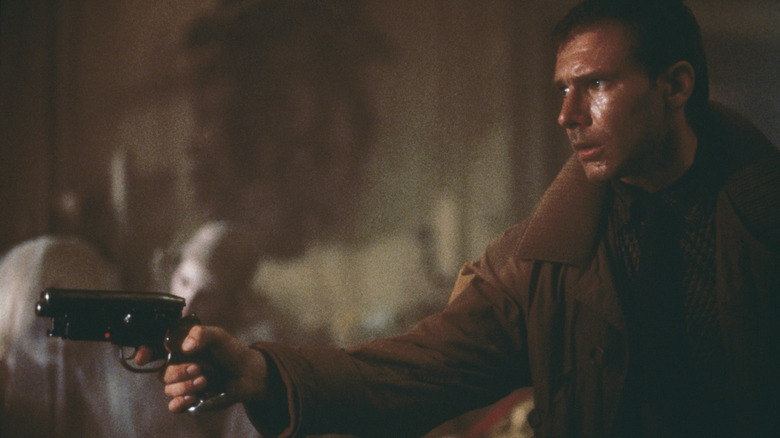Every Philip K. Dick Adaptation Ranked
Science fiction author Philip K. Dick may be one of Hollywood's biggest unsung heroes. He's responsible for some of the most famous and influential science fiction stories in the genre, with his work having inspired and been adapted into many of the most celebrated movies and television series of the last several decades. Though he never received quite as much recognition or attention as his contemporaries like Ray Bradbury, Isaac Asimov, or Robert Heinlein, he is widely seen today as one of sci-fi's greatest luminaries.
While most readers of his day were more captivated by space dramas and alien adventures, the visionary author often set his stories in dystopian futures, a subgenre that hadn't yet hit the zeitgeist. Today, however, audiences have embraced his cyberpunk futures, totalitarian governments, and twisted police states that offered a portent of things to come. Today some elements may seem awfully prescient, but the core of his stories was often more than political upheaval. Exploring themes of identity and characters who shared prophetic visions, his stories often put his lead characters on the run from dark forces.
With dystopian fiction becoming more popular every day, it's not surprising that more of his work has been adapted to screens big and small. From lesser-known indie dramas to some of the biggest blockbusters, we've ranked every major Philip K. Dick adaptation, worst to best.
19. Screamers: The Hunting
A sequel to the 1995 film "Screamers," based on the Philip K. Dick short story "Second Variety," the direct-to-DVD feature "Screamers: The Hunting" hit Netflix in 2009. Leaning into horror elements, this legacy sequel takes place decades later, and follows a rescue mission to the same remote planet, Sirius 6B, seen in the first film. Looking for the source of an unusual distress signal from the uninhabited world, they must evacuate whoever remains on the surface as the planet is about to be obliterated.
The rescue team has less than a week to evacuate the people they find, which is complicated by their discovery that the deadly screamers have the ability to take human form. But just when they think they're in the clear, their ship loses power and they too are in need of rescue.
A middling sci-fi-action-horror movie, "The Hunting" suffers the same pitfalls as most straight-to-home-video features: a low budget, B-movie acting, and a thin plot that's only there to deliver a few thrills and chills. Still, it's not all bad, with Lance Henriksen ("Aliens") and Stephen Amell ("Arrow") in the cast, and it makes for some decent Saturday afternoon entertainment.
18. Radio Free Albemuth
Based on a semi-biographical Philip K. Dick story published in 1986, after his death, the 2010 independent film "Radio Free Albemuth" stars Alanis Morissette, Kathryn Winnick, Jonathan Scarfe, and Shea Whigham. The film follows Nick Brady (Scarfe), a record label executive living in an alternate version of 1985. He begins receiving strange visions, and shares them with his wife (Winnick) and his friend, sci-fi writer Philip K. Dick (Whigham).
When his visions are revealed to be portents of the future, Nick becomes an important target of the F.A.P. (Friends of the American People), an arm of the authoritarian American government led by President Fremont. But after Nick meets Sylvia (Morissette), a woman he has seen in his visions, he learns that he's not the only one: there are dozens, if not hundreds of others receiving messages from an orbiting satellite, and they are gathering together to keep their knowledge safe as governments look to destroy it. The best way Nick and Sylvia can think to do that is by recording what they know are hidden messages within one of his record label's next albums.
Another low-budget indie film, "Radio Free Albemuth" can't match the more expensive, award-winning adaptations of his other works, but tells a more character-driven story in a dystopian fascist "future" that is now our past. Your mileage may vary, but it's a clever story with something to say, and its use of the author as a character gives it at least a unique twist.
17. Next
Perhaps the oddest film to be based on a Philip K. Dick tales, the 2007 action movie "Next" was loosely inspired by the short story "The Golden Man," published all the way back in 1953. The original story was set in a not-too-distant post-apocalyptic future overrun by mutants with incredible superhuman abilities, but focuses on one man with precognition who becomes the focus of efforts to capture him.
The film, starring Nicolas Cage, Julianne Moore, and Jessica Biel, ditches the dystopian future setting and all the other mutants, but keeps the crux of the story. Cage plays Las Vegas magician Cris Johnson, gifted with the ability to see just two minutes into the future, as well as every possible outcome of his own actions.
This makes him a valuable commodity, and he is soon on the radar of a dangerous terrorist group that wants to use his ability for their own ends. But government agent Callie Ferris (Moore) also wants to recruit him to stop those very same terrorists. At the same time, he's been plagued all his life by visions of a beautiful woman, who he now encounters while on the run, and whose presence may be key to stopping a global disaster.
Attempting to mix modern terrorist thrillers like "24" and "Die Hard" with sci-fi tropes didn't work quite as well as hoped. It wasn't exactly a faithful adaptation of Dick's story, but at just 96 minutes it's a relatively inoffensive, brisk action adventure.
16. Imposter
Not six months before the now-classic "Minority Report" landed in theaters, another film based on a story by Philip K. Dick was released, the psychological thriller "Imposter." Starring Gary Sinise ("Apollo 13"), Madeleine Stowe ("12 Monkeys"), Vincent D'Onofrio ("Full Metal Jacket"), and Mekhi Phifer ("ER"), it's set in Earth's future after an alien invasion has left the planet with a totalitarian government and fear of a future attack. Sinise stars as weapon designer Spencer Olham, who is arrested on suspicion of being an alien replicant on a mission to assassinate the Chancellor via a powerful bomb implanted in his chest.
Escaping custody, he finds his wife and allies himself with a group of rebels, who together set out to prove that he's the real Olham. But startling revelations lead him to believe a deadly alien replicant may indeed be on the loose and targeting the Chancellor. Could Olham actually be a killer robot sent to Earth to kill? And if it's not him, can he stop the real android assassin in time?
Though "Imposter" isn't quite the deep psychological drama it tries so hard to be, it's an entertaining enough adventure with a solid cast and a couple of satisfying reveals.
15. Paycheck
Based on Philip K. Dick's story of the same name, the 2003 action film "Paycheck" paired Hong Kong auteur director John Woo ("Mission Impossible II") with then-rising star Ben Affleck ("Batman v Superman: Dawn Of Justice"). Though there are some notable differences from the original story, the plot largely follows the same important beats. Affleck stars as Jennings, a highly paid engineer who freelances for various companies and reverse-engineers inventions from their rivals. But in this bizarre near-future, he has his memory of the job erased when he concludes his assignments, in exchange for a large payout.
After completing his latest job, he finds he doesn't have the $92 million in company stock he'd been promised, instead learning that during his time at the company he'd asked to swap his stock options for a curious envelope full of seemingly ordinary items. As it turns out, those items prove critical to surviving when he finds himself on the run from both the company and government agents. With the help of a woman he'd fallen in love with — who he can't remember — it's up to him to stop a nuclear holocaust.
A clever premise (Dick's specialty) mixed with some strong action made "Paycheck" a memorable thriller. Unfortunately, the same couldn't be said for Affleck, who won a Golden Raspberry for this performance and his poor showing in "Daredevil" that same year.
14. Total Recall (2012)
The second attempt at adapting the Philip K. Dick story "We Can Remember It For You Wholesale," the 2012 version of "Total Recall" stars Colin Farrell, Jessica Biel, Bryan Cranston, and Kate Beckinsale, and is directed by Len Wiseman ("Underworld"). A big-budget summer blockbuster, it updates the look and feel of the story with bigger, bolder special effects and puts Farrell into the role of Douglas Quaid, a mild-mannered blue collar laborer who dreams of an exciting life. In this future, that can be purchased for a meager price from Rekall Industries, who give him fake memories of a career as a daring secret agent.
Unfortunately for Quaid, once his new memories take hold he discovers he really is a spy, and he is now pursued by both shadowy government agents and his own wife (Beckinsale). But when he meets the beautiful Melina (Biel), he joins a rebellion that seeks to overthrow the powerful government tyrant Cohaagen (Cranston).
A film that acts more as a remake of the iconic 1990 Arnold Schwarzenegger film, 2012's "Total Recall" departs just as much from the original story. It's patterned more or less after the first film, with a few major shifts in tone and plot, and a visual style that has much more in common with the 2002 hit "Minority Report." While on its own it's a fun sci-fi adventure with strong visuals and exciting action sequences, it's hurt by comparisons to the first version — which makes us wonder why they didn't just try for a more faithful adaptation.
13. Minority Report (TV series)
Rather than a television adaptation, the short-lived Fox TV series "Minority Report" is a legacy sequel to the 2002 film of the same name. Set 11 years after the film, the series only features one returning cast member in Daniel London, as the Pre-Cog caretaker (Samantha Morton reportedly declined an offer to reprise her role). This time around, the series puts the focus on the three Pre-Cogs themselves, who were once used by the government to predict crime in the not-too-distant future.
The story introduces Dash (Stark Sands) as one of the three Pre-cogs, who after the events of the film is now a free man. With his ability to predict the future, Dash now assists local police voluntarily, and is partnered with Washington D.C. detective Lara Vega (Meagan Good). A sci-fi police procedural, each episode follows Sands' efforts to interpret his visions of the future and stop a violent crime alongside his police partner.
Though not nearly as effective as the film, the show's procedural format really works, even if its episodes are a bit uneven. Unfortunately the series just couldn't live up to the hype of being based on a blockbuster film, and its single season was slashed from 13 episodes to 10 before the show was canceled altogether.
12. Total Recall 2070
By 1999 several major motion pictures had been based on the works of Philip K. Dick, including "Blade Runner" and "Screamers," so spinning off "Total Recall" into its own series on premium cable network Showtime must have seemed like a recipe for success. While it shares its name with the Arnold Schwarzenegger film, "Total Recall 2070" actually has far more in common, both in story and style, with "Blade Runner," set in a gritty, dark metropolis and centered on a futuristic detective. The series stars Michael Easton ("Ally McBeal") as David Hume, a law enforcement agent with the Citizens Protection Bureau who is begrudgingly partnered with android replicant cop Ian Farve (Karl Pruner).
Together, the odd cop couple investigate crimes throughout the city, usually focusing on The Consortium, a collection of mega-corporations that seemingly run the future society (including the Rekall company referenced in the series' title). Their assignments also often provide clues to several ongoing mysteries that are threaded through the series, such as the death of Hume's former partner and the origin of Farve himself.
Another sci-fi police procedural, it's an underrated gem, though it suffers the same weaknesses as a lot of high concept cable fare of its day. Its big ideas are often limited by its relatively ineffective budget, while the Canadian-based production also restricts its cast and location work.
11. Screamers
Not long after the sci-fi action picture "Total Recall" had become a hit, Hollywood went back to the work of Philip K. Dick and the movie's screenwriter, Dan O'Bannon, with dreams of replicating its success. In "Screamers," Peter Weller — star of the previous decade's sci-fi blockbuster "Robocop" — plays Commander Joseph A. Hendricksson, leader of a group of rebellious laborers on the backwater planet of Sirius 6B. He and his fellow workers are embroiled in a fight with the overzealous, abusive corporation that runs the mining operation on the planet, which evolves into an all-our war.
As part of their efforts, Hendricksson and his army develop artificially intelligent robot killers, called "screamers." One such machine kills a corporate messenger on an apparent mission of mercy, who claims that there has been a truce agreed to by high-ranking leaders. But one of Hendricksson's men, who has recently been to Earth, says no such peace negotiations were underway. Determined to find out the truth, he's horrified to discover that the screamers are evolving.
A criminally under-seen movie with a darkly atmospheric tone and compelling storyline, it succeeds as an action film and has some interesting plot elements, but can't match the success of "Total Recall" five years before. Though a box office bomb, it garnered a cult following in the years following its release, which helped it eventually earn a direct-to-DVD sequel more than 15 years later.
10. Confessions Dun B'Arjo
If there's one Philip K. Dick adaptation you've never heard of it's probably this one, a French film from 1992 adapted from the book "Confessions of a Crap Artist" (yes, you read that correctly). The story happens to be the only non-science fiction novel ever published during Dick's lifetime, about an awkward and socially maladjusted young man named Jack. The film stars Hippolyte Girardot ("The French Dispatch") as Barjo, an eccentric, science-obsessed man who collects magazines, creates his own unusual inventions, and performs bizarre experiments in his own home.
When one of those experiments goes awry, Barjo's house burns down and he is forced to move in with his twin sister FanFan and her husband Charles. As a loner, Barjo struggles with being in close quarters with others, while his sister and her husband — who calls himself The Aluminum King and is confused by Barjo's odd behavior — are involved in a quarrelsome relationship.
A kind of coming-of-age story that's just as quirky as its title character, "Confessions D'un Barjo" is a Wes Anderson-eque comedy-drama about one odd man's view of the world.
9. Electric Dreams
Following the smash success of "Black Mirror," Amazon Prime Video questioned why it couldn't have its own sci-fi anthology series to stream, and looked to writer Philip K. Dick for the answer. The author had hundreds of stories to mine for potential episodes, and with a number of hit movies based on a bunch already, he seemed like the perfect author to build a series around. The result was "Philip K. Dick's Electric Dreams," an Amazon Original Series that launched in 2018.
The series' 10 episodes featured an all-star cast including Richard Madden, Bryan Cranston, Steve Buscemi, Benedict Wong, Anna Paquin, Terrence Howard, Mireille Enos, Juno Temple, and more. Standout stories included "The Hoodmaker," about a telepath who works with police to track a notorious criminal; "Autofac," about a megalithic corporation whose automated factory continues through Armageddon to terrorize a community of survivors; and "Impossible Planet," centering on two space tour guides paid handsomely to ferry an old woman to the legendary but lost planet called Earth.
Unable to shake off comparisons to the stellar "Black Mirror," the Amazon series didn't survive past its first year of stories, despite its considerable hype. That's too bad, because it might just be the most underrated sci-fi series of the decade, with strong performances, intriguing stories, and a stylish production.
8. Blade Runner: Black Lotus
Four years after the release of "Blade Runner 2049," the highly anticipated sequel to one of the most celebrated science fiction films of all time, a full season of "Blade Runner" stories landed on television. "Blade Runner: Black Lotus" was a unique project, a Japanese anime produced in collaboration between Crunchyroll and Adult Swim and directed by Shinji Aramaki and Kenji Kamiyama. It also featured an all-star voice cast that included Jessica Henwick, Will Yun Lee, Samira Wiley, Wes Bentley, Brian Cox, Josh Duhamel, and Peyton List.
The series is set almost 20 years before "Blade Runner 2049" in 2032, and introduces a young woman named Elle. Awakening with no memory of who or what she is, her only clue is a tattoo of a black lotus on her shoulder, and a strange data storage device that she carries. Teaming up with a shopkeeper named Doc Badger, Elle must find answers to her origins and stay one step ahead of the dangerous forces that pursue her. She also discovers that while she possesses incredibly dangerous skills, she is somehow unable to hurt the men who are hunting her.
Like the films on which it is based, "Black Lotus" is a hard-boiled cyberpunk thriller, but with a fast-paced energy that the movies lacked. Well-reviewed for its high-quality animation and stunning synth score, it remains a unique entry in the "Blade Runner" franchise.
7. The Adjustment Bureau
In the 2011 thriller "The Adjustment Bureau," New York congressman David Norris (Matt Damon) falls in love with a beautiful young woman named Elise (Emily Blunt), but his efforts to win her affections are repeatedly thwarted by mysterious forces. As he unwittingly stumbles upon a shadowy organization that is guiding his destiny, David is determined to fight back against fate itself to be with the woman he loves.
Like many of Dick's adaptations, "The Adjustment Bureau" takes liberties with the source material, a 1954 story titled "Adjustment Team," but the overall tone and concept are faithfully translated to the screen. A mix of science fiction, action, and romance, the film is an effective chase film with an innovative and mind-bending central premise which, like many stories from Philip K. Dick, examines the concept of free will vs. determinism.
With an impressive cast that also includes John Slattery, Terrance Stamp, and Anthony Mackie, its one of the better adaptations on this list and plays like a big budget episode of "The Twilight Zone." It deserved a better fate at the box office, but its February release did it little favors, as it came and went quickly from the public consciousness.
6. A Scanner Darkly
No, your eyes aren't fooling you, "A Scanner Darkly," based on the book of the same name by Philip K. Dick, is not a graphic novel or animated film. Using a unique rotoscoping technique perfected on his film "Waking Life," director Richard Linklater ("Dazed and Confused") turns the psychological cyberpunk drama into a psychedelic joyride through the mind of undercover law enforcement agent Bob Arctor (Keanu Reeves). The film also stars Woody Harrelson, Winona Ryder, and Robert Downey, Jr.
Set in a dystopian near-future police state where a deadly new designer drug called Substance D is sweeping the city, we meet agent Bob Arctor, who uses a tech-based "scramble" suit to disguise himself as an addict named Fred. Part of his search to find the people manufacturing the drug, Arctor's double lives become impossibly entangled when he's ordered by his superiors to investigate a new target: himself.
An ambitious, trippy drama that is totally immersive and engrossing, but also oddly off-putting with its dream-like animation, "A Scanner Darkly" will keep you guessing and always questioning the twists and turns of the story. Perhaps a little too bizarre for the mainstream, it's still one of Reeves' best lesser-known roles.
5. Total Recall (1990)
Although it's based on the cerebral, reality-twisting story "We Can Dream It For You Wholesale," the casting of Arnold Schwarzenegger guaranteed that the 1990 film "Total Recall" was going to morph into an over-the-top action adventure, with plenty of violence to match. While it departs significantly from the text, it does so with aplomb, while still retaining the important elements of the original story. That means focusing on working class hero Douglas Quaid, whose desire for a vacation leads him to an experimental procedure that will implant false memories of an exotic experience.
But rather than take an imaginary week on Mars to relax and enjoy the red sands, Quaid chooses to have memories implanted of a more exciting double life as a super spy. The problem is, the procedure appears to reactivate real memories, revealing that Quaid may actually be an undercover agent whose memory had been wiped. Now Quaid must fight to learn the truth, while helping to expose a tyrannical regime that seeks to suppress a growing rebellion on Mars led by a mysterious man named Kuato.
Though it's not a faithful adaptation, "Total Recall," directed by "RoboCop" helmer Paul Verhoeven, is perhaps one of the best action films of the era. It features one of Schwarzenegger's best performances and is filled with iconic moments and quotable dialogue. It might be the most crowd-pleasing movie adapted yet from a Philip K. Dick story.
4. The Man In The High Castle
Launched in 2017, the Amazon original series "The Man In The High Castle" was adapted from Philip K. Dick's 1962 book of the same name. Set in the same year as the book, the series' mythology largely follows the original novel, taking place in a dystopian alternate history that saw Franklin D. Roosevelt assassinated in 1933, thus delaying America's entry into World War II. As a result, Japan successfully invaded and conquered the Western U.S. while the East was taken by Hitler's Third Reich.
Now, some 15 years after the end of the war, tensions between Imperial Japan and Nazi Germany — the world's two reigning super powers — continue to escalate, while a group of American rebels gives them both constant trouble. But some citizens, who are content living under Japanese and German rule, begin to question their world when a mysterious individual called The Man In The High Castle exposes them to films containing a glimpse of alternate worlds where the Allies had won the war.
The controversial series ran for four seasons, and was met with acclaim from critics for its suspense, drama, and geo-political intrigue. The longest-running TV series adapted from a work from Philip K. Dick, it might even be considered the most successful.
3. Minority Report (movie)
Directed by Steven Spielberg, the 2002 film "Minority Report" took Philip K. Dick's story and gave it a slicker, sleeker look and feel than previous adaptations like "Blade Runner" and "Total Recall." With a cast that included Tom Cruise, Colin Farrell, and Max von Sydow, the film had serious star power, and with a sky-high budget and an acclaimed filmmaker behind the camera it looked as good as any science fiction film ever had. One of the biggest movies in a year jam-packed with big movies, it was a hit with critics, audiences, and at the box office.
Set in a not-too-distant future world where violent crime is a thing of the past, the film stars Tom Cruise as John Anderton, a high ranking officer in the Department of Pre-Crime. His division uses the talents of three psychic individuals called "Pre-Cogs" to predict crime before it happens. But when Anderton is suddenly arrested for a murder he has yet to commit, he goes on the run to prove his innocence and defy the system he has sworn to uphold. Being hunted by his own men, he soon uncovers a vast conspiracy that threatens to unravel everything they've built.
A sharp script, fine performances, shocking twists and turns, plus jaw-dropping action all add up to what might be one of the most memorable and influential sci-fi movies of the new millennium.
2. Blade Runner 2049
The long-awaited legacy sequel to one of the most groundbreaking science fiction movies ever made, "Blade Runner 2049" faced the impossible task of living up to a legend. Set some 30 years after the original "Blade Runner," the film introduces Agent K (Ryan Gosling), a Nexus-9 replicant assigned to track down and eliminate rogue replicants, much like Rick Deckard used to do. During the course of his latest case, Agent K uncovers remarkable evidence suggesting that replicants have evolved and gained the ability to reproduce biologically — a frightening prospect that could threaten the entire replicant program.
Agent K is tasked with finding a child replicant and destroying it, but his chase soon leads him to new evidence about the sinister agenda behind the creation of all of his kind. He also comes face to face with one of the most famous Blade Runners who ever lived, who may hold the key to his investigation: Rick Deckard (Harrison Ford).
Directed by Denis Villenueve ("Arrival"), "Blade Runner 2049" had the right mix of talent in front of and behind the camera, the return of original star Harrison Ford as Deckard, plus an ambitious script, mind-altering visuals, and a evocative score. It turned what could have been one of Hollywood's worst ideas for a sequel into a movie that rivals the 1982 classic.
1. Blade Runner
Cyberpunk film noir thriller "Blade Runner" is the 1982 film adapted from Philip K. Dick's 1968 novel "Do Androids Dream Of Electric Sheep?" Directed by Ridley Scott and headlined by "Star Wars" and "Raiders of the Lost Ark" star Harrison Ford, it's set in a future Los Angeles where replicant androids are servants and laborers. The plot centers on Rick Deckard, a so-called "Blade Runner" tasked with hunting down and "retiring" replicants who have gone rogue.
Deckard's latest assignment sees him hunting four replicants who have come back to Earth from off-world colonies, including a devious artificial man named Roy Batty (Rutger Hauer). But when Deckard meets and falls in love with a replicant woman named Rachael (Sean Young), he begins to question the nature of the people he's been hired to kill.
A story that plays on Dick's well-trodden concepts of identity and reality, "Blade Runner" proved a landmark picture at a time when science fiction was best known for space-faring adventure. The film's gritty aesthetic helped depict a fully realized future world, often imitated even to this day. Unlike anything audiences had seen before, it may have too far ahead of its time, as it bombed upon its release in theaters. But thanks to the emergence of extended alternate and director's cuts, it gained new life and a large fan base. Its mix of science fiction, crime noir, and action thriller elements make it an unforgettable cinematic experience that is widely regarded as one of the best sci-fi films ever made.
